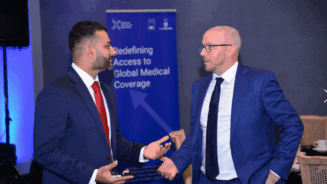For one thing, says Thomas Wright, the new owner and managing director of VFS International, you can’t always be sure that you will be able to find an underwriter willing to provide your clients with life insurance.
This is not normally a problem, of course, in Tunbridge Wells or Sevenoaks. But in some parts of Africa, providing life cover to clients “seems to go in and out of favour, depending on what the reinsurers are reading in the press at the time”, Wright reports.
Risky business
Assessing the risk levels of clients, again for insurance purposes, is also rather different in Africa than in a country like the UK. For example, despite what a London insurance actuary might think, the job of a safari guide, who takes nice rich American and English tourists around the wildlife reserves, is probably one of the safest of the local occupations, while an office worker who drives to work in Nairobi every day on the local roads would actually be considered to be at much greater risk of losing his or her life, due to the Kenyan roads’ notoriously poor quality.
Indeed, he says the many Kenyans who use small aircraft to get around “are actually seen as being safer up in the air than they would be if they were in a car on one of the local roads”.
Among some clients whose family have lived in Africa for generations, there are also some set ideas about ‘offshore’ assets – and a perceived need to keep them separate – that persist. This is a factor even now that currency controls have been relaxed, and people are largely free to bring their African money with them when they go abroad.
African background
For Wright, such quirks of financial advising in Africa do not come as the surprise that they might for some other financial services entrepreneurs.
Although he might easily pass for a Mayfair private banker or hedge fund manager, with his educated English accent, Wright was in fact born, and has spent most of his life, on the outskirts of Nairobi, Kenya’s capital city.
“My grandparents came out here during the war,” he explains. “My grandfather, who had been a butcher by profession, up in Yorkshire, had been sent by the British Army to Kenya to look after Italian prisoners of war there.
“After the war ended, he came back to England, took one look at the rationing, and went with my grandmother back to Africa, where he stayed for the rest of his life.”
Arrival at VFS
Wright started work at VFS in 1996, the year after it was founded by Peter de Putron, for whom it was a component of what eventually became the VAM Group of companies, which de Putron still owns.
“In the beginning it was called Veritas Financial Services,” Wright recalls. “But we changed it early on, after we discovered that quite a few other people had also called their companies ‘Veritas’.”
De Putron sold VFS to Wright earlier this year, in order to focus on developing VAM’s funds business.
Although de Putron moved VFS’s base to Mauritius early on in the company’s development, Wright has remained in the Nairobi area. He regards this as his strength as an adviser – although now that he finds himself the owner of VFS, he says he is necessarily taking a greater interest in the pan-African and global markets than he has had to previously.
Staying in Kenya
But he says he has no plans to move to Mauritius, even though the company will continue to maintain its regulatory presence there, because he believes his Kenyan clients will be best-served if he remains among them.
“Knowing our clients and the communities that they live in is one of our strengths as a company,” he explains.
“More than a third of the advisers who work with us have been with VFS as long as I have. Many joined at the start and are still here, another third have been with us at least ten years.
“All of them live and work among their clients, as I do, and have done so for all that period of time. As a result, many of our clients have also been with us for a very long time.”
Wright is taking on VFS at a time when Africa is being eyed speculatively by myriad outside interests – mainly for its commodity resources, but also for its potential as a market for consumer goods and services, at least in those parts of the continent where the socio-economic problems that have held it back for so long have begun to be resolved.
Nevertheless, not many advisory companies have yet attempted to venture very far into Africa, at least beyond South Africa. A market Wright says he is not particularly interested in, given its already well-developed financial services infrastructure and domination by local giants such as Old Mutual and Investec, plus certain multinational banks.
One of VFS International’s few rivals in the Africa ex-SA market is ProFin Group, a former Old Mutual entity that is based in South Africa and has a presence in a number of the same countries VFS is in. The deVere Group also has a sizeable African footprint, with offices in Botswana, Ghana, Kenya, Mauritius, Mozambique (two offices), South Africa (seven offices), Uganda, Zambia and Zimbabwe.
Global Index International, a Rio de Janeiro-based South American specialist, has representatives looking after clients in Angola and Nigeria, to assist its clients who work in the oil industry, who account for a significant proportion of its business.
Riches of Mauritius
Of the six main markets in which VFS is currently operating – Kenya, Zambia, Botswana, Malawi, Tanzania and Mauritius – the last is something of an outlier, as well as being the place where VFS has its largest presence – for now, at least.
Around ten advisers work out of VFS’s Mauritius office, looking after a client base that, more than in its other markets, is comprised of a significant proportion of recently-arrived expatriates, rather than the long-term expats and second- and third-generation locals that are the mainstay of VFS’s business elsewhere.
“I don’t think Peter (de Putron) realised, when he moved our administration operations to Mauritius, that it would end up being one of our better regions for clients and business as well,” Wright notes.
“It has become quite a hub for outsourcing, and you have all the big accountancy firms there, as well as tourism, high-end hotels and so on.”
The future
For now, Wright is taking stock of the business he has just bought, and is “not rushing to make radical changes”. However, going after more newly-arrived expatriates is in his plans, he admits.
“We are making use of our new independence to consider new ways of doing things, and perhaps looking further than we did in the past, as to which are the right products for our clients.
“But we are looking to grow the business steadily and organically, by offering the right products and services to clients, and gaining new ones by word of mouth.
“The last few years have been difficult for our clients, as they have for everyone else, but I believe that we have been doing a pretty good job of looking after our clients and holding their hands as we get through it.”




